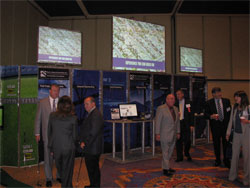General Contractors Can Be Sued by a Subcontractor’s Injured Employee
November 05, 2014 —
Craig Martin - Construction Contractor AdvisorGeneral contractors that exercise control over the worksite can be sued by a subcontractor’s injured employee. The Nebraska Supreme Court’s recent opinion, Gaytan v. Wal-Mart, should serve as a reminder that general contractors may be responsible for the safety of all workers on a job site.
In this case, a roofing subcontractor’s employee died after falling through the roof of the under-construction Wal-Mart. The deceased employee’s estate sued Wal-Mart and Gram Construction, the general contractor, alleging that they were negligent in maintaining a safe worksite.
The court initially acknowledged that an owner, the employer of an independent contractor, does not typically owe a subcontractor’s employee a duty because the owner typically has no control over the manner in which the work is to be done by the contractor. This general rule, however, has exceptions, such as where the owner retains control over the contractor’s work. But, for the exception to apply, the owner must have (1) supervised the work that caused the injury, (2) actual or constructive knowledge of the danger that caused the injury, and (3) the opportunity to prevent the injury.
Read the court decisionRead the full story...Reprinted courtesy of
Craig Martin, Lamson, Dugan and Murray, LLPMr. Martin may be contacted at
cmartin@ldmlaw.com
COVID-izing Your Construction Contract
December 21, 2020 —
Frederick E. Hedberg - Construction ExecutiveThe global COVID-19 pandemic has changed the world forever, disrupting many industries, as well as creating unprecedented challenges that threaten many businesses. The construction industry is no different. Projects throughout the country have been adversely affected by unplanned work stoppages, delays, disruptions to the supply chain, price escalations and other unanticipated events.
It is critical that owners, developers, contractors and suppliers learn from their experiences over the past year and account for the COVID-19 pandemic when drafting and negotiating contracts for their projects.
First and foremost, parties should clearly define their rights and responsibilities to properly manage risks due to COVID-19 and its impacts. COVID-19 and other key related terms should be defined, relying on the CDC and state governments for guidance, to eliminate any uncertainties. The contract should also identify executive orders, guidelines and regulations that have been issued concerning COVID-19 by states, municipalities and other authorities that have jurisdiction where the project is located.
Reprinted courtesy of
Frederick E. Hedberg, Construction Executive, a publication of Associated Builders and Contractors. All rights reserved.
Mr. Hedberg may be contacted at fhedberg@rc.com
Read the court decisionRead the full story...Reprinted courtesy of
Alleged Damage to Personal Property Does Not Revive Coverage for Construction Defects
November 23, 2016 —
Tred R. Eyerly – Insurance Law HawaiiThe Illinois Appellate Court determined the general contractor was not covered for construction defects despite allegations of damage to personal property. Wesfield Ins. Co. v. West Van Buren, LLC, 59 N.E. 2d 877, (Ill. Ct. App. 2016).
The developer constructed a condominium development in Chicago. The installation of the roof was contracted to Total Roofing. Total Roofing agreed to insure and indemnify the developer against liability for Total Roofing's work. Total Roofing obtained a CGL policy with Westfield Insurance Company listing the developer as an additional insured.
Read the court decisionRead the full story...Reprinted courtesy of
Tred R. Eyerly, Insurance Law HawaiiMr. Eyerly may be contacted at
te@hawaiilawyer.com
Colorado Legislative Update: HB 20-1155, HB 20-1290, and HB 20-1348
August 03, 2020 —
Jean Meyer - Colorado Construction LitigationThis year’s Colorado State Legislative session was cut short. However, in the period of time Colorado’s Legislature was in session, it passed and evaluated important legislation for Colorado homebuilders. This article highlights relevant legislation for Colorado homebuilders.
1. HB 20-1155
This Bill creates new requirements on new homebuilders to offer renewable energy systems to the buyer of a new home. Specifically, the Bill requires homebuilders to offer each of the following:
- A solar panel system, a solar thermal system, or both;
- Prewiring or pre-plumbing for the above solar systems; and,
- A chase or conduit for future installation of such systems.
The Bill further requires Colorado homebuilders to offer homebuyers one of the following:
- An electric vehicle charging system;
- Prewiring for the future installation for such a system; or,
- A plug-in receptacle in a place accessible to a vehicle parking area.
Read the court decisionRead the full story...Reprinted courtesy of
Jean Meyer, Higgins, Hopkins, McLain & Roswell, LLCMr. Meyer may be contacted at
meyer@hhmrlaw.com
Reminder: A Little Pain Now Can Save a Lot of Pain Later
April 28, 2016 —
Christopher G. Hill – Construction Law MusingsI know, you think you hear it enough from me here at Construction Law Musings. I am seemingly constantly beating the drum of early advice from a construction attorney and the benefits of spending a bit of money now to avoid spending a lot of money later. I do this because real world examples of both the costs of failing to prepare early and the benefits of following this advice abound.
An example of the costs of failing to prepare early can be
found at the Construction Payment where the zLien folks discuss a New Hampshire case where a contractor lost two thirds of its potential damages because it did not properly set out the contractual terms and what was to be included in contractual damages. Without any clear line to go on, the Court found liability against the NHDOT for negligent misrepresentation and could only award damages up to a cap that was approximately a third of the damages awarded by the jury and about half of what the trial court had determined to be the damages.
Read the court decisionRead the full story...Reprinted courtesy of
Christopher G. Hill, Law Office of Christopher G. Hill, PCMr. Hill may be contacted at
chrisghill@constructionlawva.com
2011 West Coast Casualty Construction Defect Seminar – Recap
June 01, 2011 —
CDJ STAFF �  | �
�| Event exhibitors and sponsors contribute to an informative and engaging environment | �
�This year’s meeting was the best yet for the industry-leading construction defect and claims event.
�This year’s seminar concluded on May 13, 2011 with the Construction Defect Community Charitable Foundation Golf Tournament, held at Strawberry Farms Golf Course.
�The Disneyland Hotel in Anaheim, California was the place where more than 1,500 attendees convened for two days of professional development activities and seminars that included CLE workshops and panel discussions of special interest to legal and insurance professionals concerned with construction defect and claims litigation. Key events included “Challenges for Experts in Construction Defect Claims and Litigation,” “Keeping Up with Construction Defect Coverage,” and “Tips for Avoiding the ‘Perfect Storm’ in Handling of Wrap Claims.”
� �  | �
�| Supporting the golf tournament at the 15th hole | �
�This year’s Ollie award was given to George D. Calkins II, Esq. The West Coast Casualty Jerrold S. Oliver Award of Excellence was named in honor of the late Judge Jerrold S. Oliver, and recognizes an individual who is outstanding or has contributed to the betterment of the construction community.
�In addition to being the most comprehensive professional development seminar in the area of construction defects, this year’s seminar was equally valuable as a networking opportunity for members of the industry. People participated in professional development events during the day and then continued networking in the evening at numerous social events. The Lawn Party as well as the legendary Wood, Smith, Henning & Berman events were very well attended. Additional valuable networking events were hosted by a number of industry professionals at the House of Blues, and Tortilla Joe’s.
�As of this writing the 2011, West Coast Casualty's Construction Defect Seminar has applied for or has already received the following continuing education accreditation in the following areas;
�Read the full story…
�For more information about next year’s event, visit West Coast Casualty.
Read the court decisionRead the full story...Reprinted courtesy of
South Caroline Holds Actual Cash Value Can Include Depreciation of Labor Costs
July 05, 2021 —
Tred R. Eyerly - Insurance Law HawaiiAnswering a certified question, the South Carolina Supreme Court held that the insurer could calculate actual cash value (ACV) by including an estimate of the depreciation of embedded labor costs. Butler v. Travelers Home & Marine Ins. Co., 2021 S. C. LEXIS 51 (S.C. May 12, 2021).
Two insureds had their homes damaged in separate fires. Each held homeowners' policies with Travelers. The policies provided replacement cost value coverage to repair or replace damaged portions of homes. In the event that the insures chose not to immediately repair or replace the damaged home, the policies afforded payment to the insured for the actual cash value instead of replacement cost value. Both insured elected not to immediately repair or replace their homes, thereby deciding to accept a cash payment for the ACV of the damaged property. Neither was satisfied with the payment and both filed suit in federal district court.
Travelers determined the ACV payment by estimating the replacement cost value (RCV) of the damage and then subtracting depreciation. The certified question presented by the federal district court was whether Travelers could depreciate the labor component of the costs of repair or replacement when determining the ACV.
Read the court decisionRead the full story...Reprinted courtesy of
Tred R. Eyerly, Damon Key Leong Kupchak HastertMr. Eyerly may be contacted at
te@hawaiilawyer.com
Waiving Workers’ Compensation Immunity for Indemnity: Demystifying a Common and Scary-Looking Contract Term
October 07, 2016 —
James R. Lynch – Ahlers & Cressman PLLCParties to a construction contract are often skeptical of terms in bold fonts, capital letters, or underlining, and especially terms requiring separate signatures or initials. A natural assumption is that such terms must be harmful if they require such emphasis. This concern is further heightened when the term involves complex areas of law, or waivers of rights that the party may not fully understand. In such cases, a little knowledge can go a long way.
Read the court decisionRead the full story...Reprinted courtesy of
James R. Lynch, Ahlers & Cressman PLLCMr. Lynch may be contacted at
jlynch@ac-lawyers.com




































































